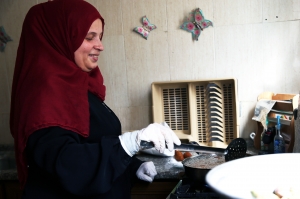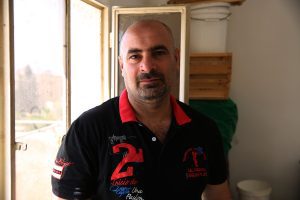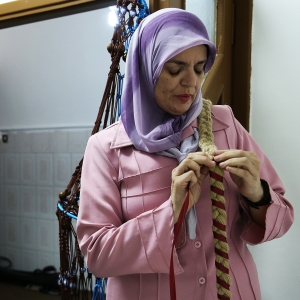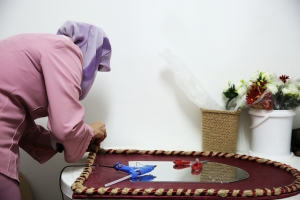In recent years, hundreds of thousands of families have fled war and violence in Syria and Iraq to seek refuge in Jordan – where over 738,000 refugees now reside. Upon their arrival, the struggle to gain their footing and rebuild their life begins and often continues for many years. It is in this landscape that NEF is working to provide both vulnerable Jordanian families and refugee families with safe and sustainable opportunities to earn an income and regain economic stability.
_____________________________________
Asma
“When I went to see how the houses were destroyed, it was a very difficult feeling. Fifteen or sixteen years were taken away within a moment.”
Asma operates a local cooking business in Jordan. Her prepared meals and catered goods have gained a reputation in her neighborhood and demand for her product has grown, allowing the family to pay down their debts and meet their needs. She is proud of what she has been able to achieve with this activity saying, “I have a stronger personality now. I want to make sure my product is perfect, unique, and different from the other products in the markets.” She has gained confidence and independence, especially with regard to decision-making on where to spend money, saying, “Now if my kids ask anything from me, I can do it.”
Asma’s outlook is much different than just a few years ago in 2013 when Asma and her family were forced to flee their hometown in Syria after their neighborhood was raided and bombed leaving their home destroyed. Like nearly 80 percent of the refugees who seek safety in Jordan, Asma’s family chose not to remain in a refugee camp and moved into a low-income community in Jordan’s urban sprawl.
Although she and her husband found informal work cleaning houses, cars, and cooking for neighbors, they were unable to earn enough to meet the family’s basic needs. Describing this time, Asma said, “The monthly money that my husband was making was not enough to cover all of the monthly expenses. It ran out the middle of the month.”
Asma and her family faced many of the logistical and emotional challenges that confront refugee families starting over in a new place—difficulties finding sustainable, safe, and dignified jobs, accruing debt during the resettlement process, limited access to credit, feelings of isolation, acclimating children who have experienced trauma to new lives and new schools.
The strain of these challenges reach beyond the refugee community to the host community as well—resulting in declining income and rising poverty, unemployment, and debt. Without help, vulnerable families often resort to harmful strategies such as begging, early marriage, or child labor to get by.

NEF is working to address these issues by providing refugees and Jordanians with the support they need to overcome these mounting challenges and set out on a path to secure a steady source of income. NEF offers trainings on business development, employability, vocational trades, and financial literacy in some of Jordan’s most vulnerable communities. Paired with the trainings are small business grants, social networking, and on-going mentoring and coaching for new entrepreneurs.
Through NEF-led trainings, Asma learned how to develop a business model, market her products, interact with customers, set prices, and enter into new markets. With the project grant she received at the completion of the program, she purchased a refrigerator for food preservation, giving her as she says, the “push” she needed to really get started.
Asma’s household has seen a 50 percent increase in income from her cooking business. Her customer base continues to grow, and she is planning to invest in additional equipment and another refrigerator to keep up with increasing demand. The family has now started to save some money for the future and emergency expenses which brings Asma and her husband great peace of mind.
On overcoming the challenges she and other refugees face as they rebuild, Asma says, “Why should we feel as though we are weak? We have to prove our presence in our community and defy anything that comes our way. For the sake of our children and for future generations, we should show them that we must never give up.”
Qaiser
 “The honey trade is a beautiful business and a clean business. I hope to expand my business and develop it to export honey to Iraq or outside Jordan.”
“The honey trade is a beautiful business and a clean business. I hope to expand my business and develop it to export honey to Iraq or outside Jordan.”
Qaiser is 41 years-old. He is a husband and father of four, a son and three daughters. He and his family moved to Jordan from Iraq in 2013.
Qaiser entered NEF’s program with the idea to start a business producing honey to be used for both general consumption and its homeopathic health benefits. His reason was simple, “It was an opportunity to start businesses so that we [refugees] are able to stop relying on assistance.”
For Qaiser, starting a small business was just as much about boosting his morale and motivation as it was to develop a source of income. While adjusting to his new life in Jordan, difficulties finding work and having to rely on humanitarian aid made it difficult for him to keep a positive outlook. He shared that he still finds it extremely difficult to think about his family back Iraq, especially his parents, but says, “There are big differences between now and before, any support that you get pushes you to improve and increases morale of the individual and the family.”
 When describing the circumstances under which they left Baghdad, Qaiser says, “There was sectarian turmoil. There were dead bodies in the streets, and I was afraid for my family.” That is when they left everything and came to Jordan to start a new life.
When describing the circumstances under which they left Baghdad, Qaiser says, “There was sectarian turmoil. There were dead bodies in the streets, and I was afraid for my family.” That is when they left everything and came to Jordan to start a new life.
Now the whole family contributes to making the business successful. “They help so much in my business, and they work beside me preparing honey and filling bottles. They work with me for many hours, and they get as tired as I do,” says Qaiser.
In addition to covering the family’s basic needs, profits from the business allow Qaiser to provide other items such as school stationary, toys for his children, and vitamins for his wife who is currently pregnant with their fifth child.
On what he learned from the trainings Qaiser says, “I benefited so much from my participation in the project, because I learned how to enter the market, how to do marketing for my product, how to build trust with customers, and many other things that improved my business idea.”
Qaiser, Honey Producer from Near East Foundation on Vimeo.
Hanan
 “There are no challenges or obstacles too great for the blind. They have many opportunities but they need more support because the society has the wrong idea that the blind can’t do anything and they should just stay at home.”
“There are no challenges or obstacles too great for the blind. They have many opportunities but they need more support because the society has the wrong idea that the blind can’t do anything and they should just stay at home.”
Hanan is a 45-year-old Jordanian woman who sells handwoven goods to earn supplemental income to support her 18-year-old son. This is a worthy achievement in its own right, made that much more notable when considering that Hanan lost her sight when she was just 28 years-old.
In recent years, Hanan has pursued a new chapter and become a skilled weaver. And with NEF’s assistance, she turned what was once a hobby into a way to generate income.
Hanan shared that it boosted her morale greatly when she learned that there was an organization interested in helping people like her, with disabilities. Of the training, she explained, “The trainer was so good and had an easy training methodology, and NEF’s team also had a good way of communicating with me. Therefore, I continued the training and the trainer explained everything to me and there were a lot of women participating, so it felt real and not like just a hobby.” With the knowledge she gained from NEF-led trainings, and the project grant she was awarded, Hanan purchased materials she needed and started getting her products in front of new customers at trade shows, public markets, and community association activities.
 Hanan is steadily gaining more customers and bringing in around 20 JD ($30) per month in revenue from her business. She said that she now makes decisions at home about how to spend her money without having to ask permission and has confidence in her decisions and home management. She expresses her desire to continue to build her business saying, “I want to reach people with my products, and that was the most important thing to me. NEF supported me very much both physically and emotionally, I thank them so much for their efforts because this experience taught us [women] how to depend on ourselves, it taught me personally that the blind can do everything we want. I am able to prove to people that I can work and be productive.”
Hanan is steadily gaining more customers and bringing in around 20 JD ($30) per month in revenue from her business. She said that she now makes decisions at home about how to spend her money without having to ask permission and has confidence in her decisions and home management. She expresses her desire to continue to build her business saying, “I want to reach people with my products, and that was the most important thing to me. NEF supported me very much both physically and emotionally, I thank them so much for their efforts because this experience taught us [women] how to depend on ourselves, it taught me personally that the blind can do everything we want. I am able to prove to people that I can work and be productive.”
NEF’s work in Jordan is funded by the U.S. State Department’s Bureau of Population, Refugees, and Migration (BPRM) and City & Guilds.
Click here to learn more about NEF’s work in Jordan.



